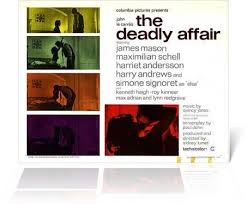
THE DEADLY AFFAIR
UK, 1966, 107 minutes, Colour.
James Mason, Simone Signoret, Maximilian Schell, Harriet Anderssen, Harry Andrews, Roy Kinnear, Max Adrian, Lynn Redgrave, Royal Shakespeare Company with David Warner, Michael Bryant.
Directed by Sidney Lumet.
The Deadly Affair was directed by Sidney Lumet. It was made in the mid-sixties, when Lumet had come to some kind of peak in his film-making with The Pawnbroker, The Hill, The Group. This film was not so popular although in retrospect it has been well praised. It may need to be seen in the light of Lumet's success in the mid-seventies with Network, Dog Day Afternoon and Serpico. James Mason has featured in a number of Lumet's films. He is excellent in the role of a man caught in a world of espionage and betrayal. A strong international cast including Maximilian Schell and Harriet Anderssen and Simone Signoret performed very well indeed. The film stands up well on its own, but it is also a sour and cynical commentary on the popularity of espionage films in the mid-sixties.
1. The significance of the title and its ambiguities? The focus on 'deadly' as a consequence of an affair?
2. The 1960's and the cinematic genre of spies? The reaction to the fantasy spy stories with pictures of bleak reality? The world of John Le Carre and his spies in the cold? How real a world of espionage was this? Audience response to the drab realistic world of espionage? How enjoyable are these bleak dramas?
3. The importance of the credits sequence and the relationship of husband and wife? The use of colour, dingy locations? London, business offices, theatre? The 60s style modern music?
4. The opening and its ambiguity? The conversation between Dobbs and the suspected man? The ambiguities as a basis for the plot complexities? How interesting and convincing were the complexities of the plot? The world of truth and lies, appearances and reality? The effect on Dobbs and on all the people concerned?
5. What kind of man was Dobbs? The ordinary public servant in the bowler hat? His doing his job properly? Interviewing suspects? Interviewing wives? His disillusionment with his job and the head officials? His relationship with his friend Dieter and the memories of the war and espionage well done? His relationship with the police and the investigation?
6. What motivated Dobbs to search out the tangle and seek the truth? The physical and mental suffering involved in seeking out the truth? His being bashed, worried, disillusioned with his wife and friend? His being physically sick in the theatre? The necessity of confronting Dieter with the truth? His trying to be gentle and finding that that did not work with his wife? The move to aggressiveness? What future did he have in regard to his work, relationship with his wife? How good a study of a person in the public service and espionage role?
7. Dobbs' wife and the complexities of her personality? His love for her, her taunting him, her flaunting of her affairs? The irony of her deadly affair with Dieter? His not loving her? Her disillusionment? Dobbs and his wife building at the end on the ruins of the affair?
8. The audience's response to Elsa? Her concentration camp background, her involvement in espionage? Her idealism and loyalty to him? Her truth and her lies? Her falling into the trap with Dieter? Her reaction to Dobbs and despising him? Her rebuking him about life and death and spying? The pathos of her feeling trapped in the theatre? The pathos of her death? How credible were she and her husband as spies?
9. The picture of the police in the person of Mendell? His idiosyncrasies with his animals, falling asleep, his seeking out of facts and not fiction? A light touch in this characterization, yet efficiency with his work, especially with the garage owner? The pathos of his death in the gutter?
10. The picture of espionage superiors and their manipulation? Their responsibility to government? Their imposing on their subordinates?
11. The picture of offices, files which could be raided, the world of cafes and raids into business offices? Dead bodies on lifts? Police following cars? Giving pursuers the slip?
12. The importance of the theatre sequences adding a different touch of flavour? The visit to the provincial theatre and the rehearsal of "Macbeth"? Virgin and her background in the theatre? Her giving vital information? The transition from the theatre in the provinces to the Royal Shakespeare Company? The performance of "Edward IV' and the betrayal and murder parallelling that in the audience?
13. The contribution of the chases, Scarr and the interlude with him in the cafe, the murders?
14. How well integrated by the end were the complexities of the plot, the characterizations? The appropriate climax with Dobbs confronting Dieter and Dieter's death? An exploration of human nature? The social and bleak world of the 20th century?